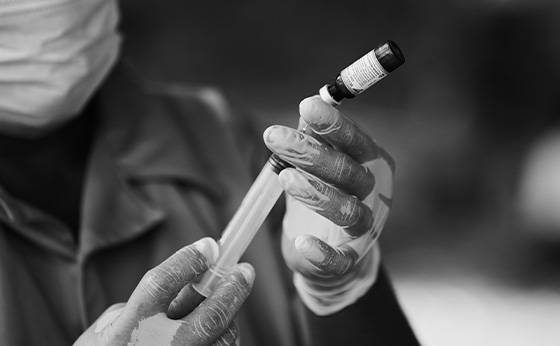We’re working with local communities in East New Britian province, Papua New Guinea, to reach unvaccinated and under-vaccinated children.
Papua New Guinea (PNG) has some of the lowest immunisation rates in the world, and many children aren't getting their necessary vaccines. One example is the vaccine for Diptheria-Tetanus-Pertussis, also known as DTP or DTaP. This shot protects against diptheria, tetanus (lockjaw) and pertussis (whooping cough). It can save infants and children from serious infection or even death. But as of 2023, 59% of people in East New Britain were estimated to be ‘zero-dose’. That means over half the population had not received a single dose of the DTP vaccine.
Our project seeks to address this issue. We're partnering with local communities in PNG to improve vaccination where it's needed most.

Project aims
Vaccines save lives, so we need to understand the challenges that are stopping people from getting immunised. Our project aims to:
- identify ‘zero-dose’ and under-immunised children in East New Britain, PNG
- identify challenges and opportunities of childhood vaccination in East New Britain
- develop and implement strategies to overcome these challenges and increase immunisation coverage.
Methods
To understand the problem, we talked to local community members in East New Britain. This included caregivers, healthcare workers and community and religious leaders.
We conducted surveys, in-depth interviews and focus groups. We also used a set of tools from the World Health Organization, called the Behavioural and Social Drivers (BeSD) of Vaccination.
We then worked with the East New Britain Provincial Health Authority (ENBPHA) to analyse our findings. We identified 3 major barriers to routine immunisation:
- lack of community awareness about how to get vaccinated
- long wait times and inconsistent availability
- insufficient training for health workers.
To address these issues, we worked with government and local community members. We used workshops and consultation to develop a culturally responsive strategy.
As of 2025, our team is implementing the following 3 strategies:
- raising awareness about vaccines
- helping local leaders share the importance of vaccination
- training healthcare workers to deliver vaccines.
At all stages, we partner with local communities to ensure this work is sensitive and appropriate. The project runs from July 2022 to June 2025.
Read our latest research, including our published research and data from year 1 of the project.
Collaborators
East New Britain Provincial Health Authority
Papua New Guinea Institute of Medical Research
Papua New Guinea National Department of Health
Murdoch Children’s Research Institute
Funding partners
Australian Government
Drakensberg Trust
Baker Foundation




